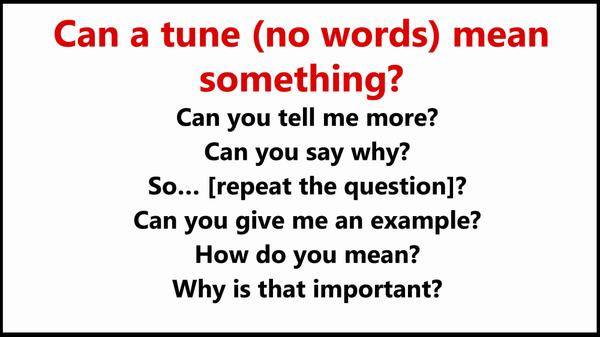r
Each slide or card features one of 39 different red questions for the “facilitatee” in each pair to answer. The black questions, which are the same every time, are for use by the facilitator in each pair to push the thinking deeper. The facilitator can only use the black questions and cannot put in his or her own ideas.
r
In the Powerpoint version, all the pairs in the class can work from the same slide, and you can then advance to the next slide so that facilitator and facilitatee can swap roles.
r
If you chop up the cards in the PDF to run a cocktail party, everyone picks up a card and then mills around the empty space to find a partner. One in each pair asks their partner the red question, and then facilitates their thinking using the black questions. Then they swap roles and use the other red question in their pair. Once each has had a turn as facilitator, they swap cards and find new partners. That way, people will tend to get to experience the same question twice, once as facilitator and once as facilitatee.
r
Tom ran the powerpoint version of this with Year 5, and we have run the Cocktail Party version with teachers, and it has been very successful.
r
Inflexive Facilitation
The black “contentless” questions were culled/developed from a recent training exchange Tom and I had with www.philosophy-foundation.org They train and place philosophy graduates in schools for regular visits, rather like the residencies Tom does. They also provide excellent free resources, and the books, especially “If Machine” and “If Odyssey” are good investments.
r
These questions got me thinking about how similar good facilitation is to other practices, such as coaching and counselling, in which the aim is to draw thinking out through skilful, non-leading questions, rather than for the facilitator to impose a view. I’m using the term “inflexive” for this sort of facilitation, which turns the thinking back in upon itself. It is closely connected to good listening and a shift in power from teacher to pupils, and fits with the “Take A Back Seat” principle of Philosophy Circles.
r
The tricky thing in a classroom situation is that this sort of probing keeps the focus on one child, which has a cost in terms of how many people get to talk, and so getting the children to do more of the facilitation themselves in pairs may be a way to get maximise depth and participation at the same time.
r
This is one of our
free P4C resources that can arrive direct to your inbox, every week. Just click that link to sign up!
